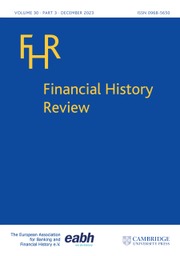Article contents
From gentlemanly capitalism to lobbying capitalism: the City and the EEC, 1972–1992
Published online by Cambridge University Press: 10 November 2020
Abstract
The City of London has long attracted much academic and popular attention. However, little research has been done on the relationship between the City and the European Economic Community in the 1970s and 1980s, despite the accession of the United Kingdom in 1973. Based on archival material from central and commercial banks in the UK and France, this article explores the relationship between the City and the EEC, from the accession of the UK to the EEC in 1973 to the Maastricht Treaty in 1992, which was meant to be the year of the completion of the single financial market. The article explores two areas: the influence of the City on EEC financial regulation, and how this influence was exerted. It pays particular attention to two committees chaired by the Bank of England, the City Liaison Committee and the City EEC Liaison Committee, and to British banks. The article argues that if the EEC played a part in the formalisation of British banking regulation, the City also played a key role in shaping EEC plans for financial regulation.
JEL classification
- Type
- Articles
- Information
- Financial History Review , Volume 27 , Special Issue 3: Finance, financiers and financial centres: a special issue in honour of Youssef Cassis , December 2020 , pp. 376 - 396
- Copyright
- Copyright © The Author(s), 2020. Published by Cambridge University Press on behalf of the European Association for Banking and Financial History
Footnotes
This project has received funding from the European Research Council (ERC) under the European Union's Horizon 2020 research and innovation programme (grant agreement no. 716849). My thanks go to Martin Daunton, Edoardo Altamura, Emmanuel Mourlon-Druol and an anonymous reviewer for their constructive comments. All errors and omissions are my own.
References
Sources
References
- 4
- Cited by



